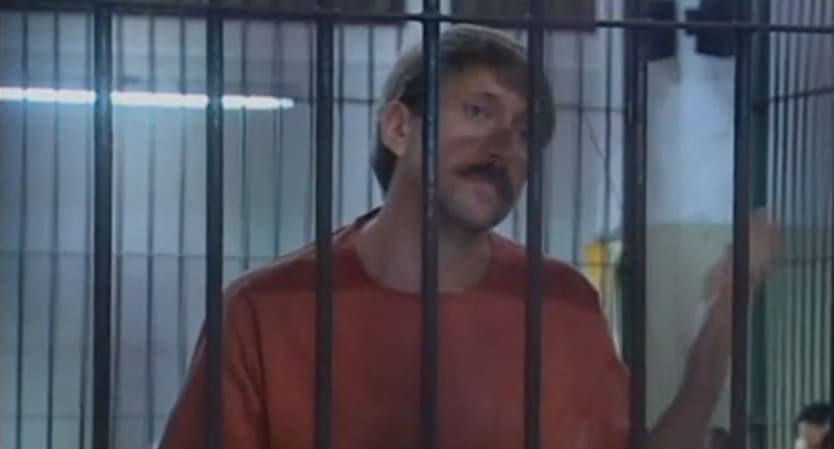Everyone’s favourite bad-guy, Victor Bout, went on trial in New York this week, charged with attempting to sell arms to a listed terrorist organisation, namely Colombia’s FARC. Bout has pleaded not guilty. Bout’s lawyer’s first line of defense is to challenge the court’s jurisdiction, on the grounds that his arrest in Thailand as part of a U.S. Drug Enforcement Agency sting operation was illegal under Thai law. Expect the case to hear some months of legal wrangling. The indictments you can find here.
httpv://www.youtube.com/watch?v=W2FNfkVgixQ&feature=player_embedded
Bout’s trial follows almost two years spent in a Thai prison while U.S. and Russian lawyers fought a diplomatic and court-room tug-of-war over his extradition to the US. Bout, a former Russian air force officer, has long been a focus of United Nations sanctions monitors, who spotted his planes in a variety of murderous conflicts, mostly in Africa, during the 1990s.
But Russia is by no means alone in producing so-called Merchants of Death and related bad-guys. A trial in a US federal court has brought to light the Cold War-era machinations against and among Cubans, including the likes of Margarita Morales Fernandez, a former CIA operative on trial in a US federal court in connection with the killing of 73 people in the downing of a Cuban airplane in 1976 “in one of the world’s worst airline attacks before September 11, 2001”. In The Netherlands, a court is hearing additional evidence in connection with the case of Guus van Kouwenhoven, who is accused of arms deals in connection with Charles Taylor’s regime in Liberia.
Back in the 1980s, retired spook Edwin P. Wilson – also dubbed the Merchant of Death by at least one author (Joseph Goulden “Merchant of Death” from 1984) – was put away for 27 years by U.S. authorities for allegedly selling arms and explosives (the explosives charges were later overturned). For a time, he avoided US jurisdiction by living in Libya but was eventually tricked into flying to the Dominican Republic, arrested there and shipped to the U.S. for trial. Sound familiar?
This week the New York times featured a story of another CIA retiree, this one a former operative named Duane Claridge, who has also had his run in with the law, including an indictment (and then Presidential pardon) during the Iran-Contra affair in the late 1980s. Like Wilson before him, Claridge is reported to have come to the attention of law enforcement because his operations strayed across the rather vague lines that seems to mark the difference between useful friend and criminal irritant in the world of spies and arms dealers. Claridge reportedly built his of own network of spies in pursuit of his own personal foreign policy. Still, like Wilson before him, the NYT reports that he seems to have been doing so at times in the service of U.S. intelligence agencies.
Not surprisingly, arms-length deniability remains an attractive commodity for the spooks. During decades of legal proceedings in Wilson’s case, it became clear that, despite initial denials, he had probably been working in coordination with his old employers on at least some of his activities. Victor Bout’s planes were at one point was reported to have flown in support to the U.S. forces in Iraq (they needed all the re-supply help they could get apparently, and were not reading UN sanctions reports), according to the Financial Times.
httpv://www.youtube.com/watch?v=VHn1zogeyO4
If all of this seems like something from a Hollywood movie, well, it is. Lord of War stars Nicholas Cage as the fictional merchant of death, a role rumoured to have been based in part on Bout’s modus operandi. The film’s opening three minutes on the life cycle of bullet – from unnamed east European ammunition factory all the way to the forehead of an African child soldier – is probably the best indictment of the arms trade Hollywood has ever produced. The rest of the film is the usual thriller romp, although the scene in which Cage’s planeload of weapons gets ‘pulled over’ by the proverbial aerial jet-cop of international law enforcement is notable for the fact that there is no such thing (with jets usually being reserved for rendition of miss-identified terrorists to secret prisons, rather than nabbing international arms traffickers. I mean, the law has got to have some priorities, right?)
